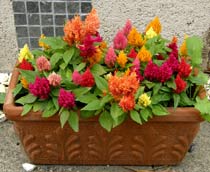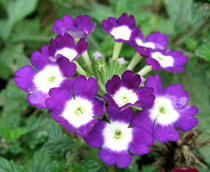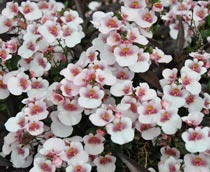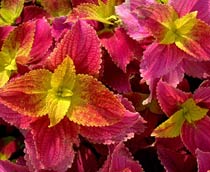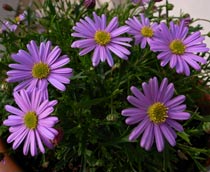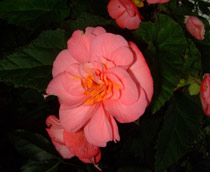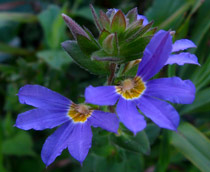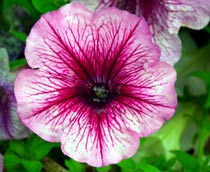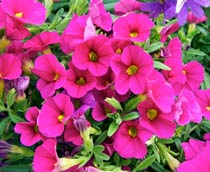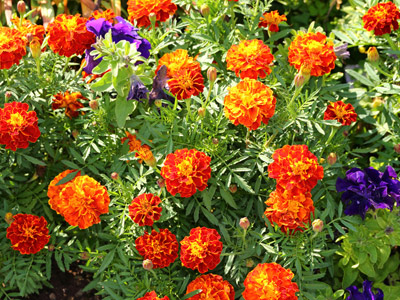
Container plants brighten up any small corner!
Annuals - Container Plants 1
Even the tiniest garden can accommodate a patio planter or hanging basket and watching them grow to maturity invariably provides great enjoyment.
The good news is that there are very few 'rules' about which plants to put alongside other plants – nature has a wonderful way of blending together wildly contrasting colours that would make a fashion guru cringe! We hope that these quizzes provide you with both a little inspiration and a little knowledge.
1 .
This is a close relative of Cockscomb. To which plant genus does it belong?
Artemesia
Celosia
Freesia
Fuchsia
- Fascinating feathery flowers!
- In America they are sometimes referred to as 'Wool flowers' but this term is seldom used in the UK.
- Available in a range of reds, pinks and yellows.
- Does best in warm weather and excels on a hot patio that is in full sun and shaded from the wind.
- Filling a container with several plants of different colours makes for a striking display - see photograph.
2 .
Plants of the Verbena genus are often known as what?
Vermin
Vermuth
Vermillion
Vervain
- Both 'upright' and 'trailing' varieties are available in many different colours.
- Throughout history stories abound about its mystical and divine properties.
- The plant is not as vigorous as some basket and patio plants so take care not to plant it alongside very fast growing plants such as Surfinias.
- The flowering period can be extended by dead heading.
3 .
Nemesia for bedding out are normally grown from seed but selected varieties for tubs and patio containers are often propagated by means of what?
Cuttings
Division
Grafting
Stolons
- Available in many different colours - both vivid and pastel tones.
- Thrives in full sun but will tolerate a little shade.
- Varieties of bedding Verbena tend to be short-lived but the more choice ones (usually vegetatively propagated) for use in baskets and tubs will flower for much longer.
4 .
What is the common name of Coleus?
Flame of the Forest
Flame Nettle
Flaming Vera
Forest Flame
- Belongs to the genus known as Solenostemon.
- Grown for its decorative foliage in many different colours.
- A perennial that is usually treated as an annual.
- Sometimes grown as a house plant.
- It looks stunning provided that it is protected from the ravages of extreme summer weather - strong winds, hail or very heavy rain will decimate the delicate leaves.
5 .
Can Fuchsias be grown from seed?
Yes, all of them are
Yes, with great success
Yes, with uncertain results
No
- Deservedly one of the most popular plants found on British patios.
- The plant is named after the celebrated German botanist Leonhart Fuchs (1501–1566).
- Flowers come in all shapes, sizes and colours.
- Happy in both light shade and full sun.
- Needs to be kept well-watered for the best results.
- Some varieties are hardy and in the south of the country they are sometimes used as a hedging plant.
All the named varieties that are so popular in gardens are grown from cuttings
6 .
What is the name of this popular hanging basket plant?
Bidens
Brachycome
Diascia
Nemesia
- Sometimes known as the Swan River Daisy.
- The Swan River is a tourist attraction in Western Australia and the plant is native to that region.
- Masses of small daisy-like flowers throughout the summer.
- Delicate and fascinating foliage adds to its appeal.
- Available in shades of blue, lilac, pink and white.
7 .
This type of Begonia is grown from what?
Bulbs
Corms
Rhizomes
Tubers
- Available in a range of vibrant colours.
- Choice, individual plants can have blooms up to 15cm across and can be very expensive to buy from specialist growers but they can be kept from one year to the next.
- Garden centres usually sell cheaper mixed varieties that are raised from seed each year.
- Needs plenty of water and grows best in light shade although it will produce some flowers even in deep shade.
It is usually referred to as Tuberous Begonia to distinguish it from Begonia Semperflorens and other types of Begonia
8 .
Even when they are in pristine condition these flowers look as if they have lost some of their petals. What is the name of the plant?
Scaevola
Schotia
Schinus
Scopolia
- Sometimes known as the Fan flower or Half flower because of the shape of its flowers.
- An ideal plant for hanging baskets.
- Vigorous growth means that the plant can trail a metre or more by the end of the summer.
- Survives very dry conditions and when mixed hanging baskets have been neglected this plant is often the sole survivor!
9 .
Petunia flowers that have this type of marking are usually referred to as what?
Branching
Streaked
Striped
Veined
- Thrives in almost any soil and situation. One of the most reliable of all garden plants.
- Varieties have now been bred that have many striking flower patterns.
- With such a wealth of interesting and different colours available it always seems a pity to grow the mundane reds and pinks that are so often seen.
- It's worthwhile hunting down the more unusual varieties in garden centres.
10 .
This is a variety of Petunia that has a profusion of small flowers on a plant with a trailing habit. What is its name?
Thousand Bells
Million Bells
Trillion Bells
Zillion Bells
- Available in a range of mainly pastel colours.
- Like all Petunias the plant is well equipped to deal with dry conditions - it flourishes on comparatively little water.
- When compost is kept constantly moist it tends to go leggy by the end of the summer.
- Grows quickly and rapidly fills the space allotted and in a mixed planting it often crowds out its neighbours!
**Unlimited Quizzes Await You! 🚀**
Hey there, quiz champ! 🌟 You've already tackled today's free questions.
Ready for more?
Ready for more?
🔓 Unlock UNLIMITED Quizzes and challenge yourself every day. But that's
not all...
not all...
🔥 As a Subscriber you can join our thrilling "Daily Streak" against other
quizzers. Try to win a coveted spot on our Hall of Fame Page.
quizzers. Try to win a coveted spot on our Hall of Fame Page.
Don't miss out! Join us now and keep the fun rolling. 🎉
**Unlimited Quizzes Await You! 🚀**
Hey there, quiz champ! 🌟 You've already tackled today's free questions. Ready for more?
🔓 Unlock UNLIMITED Quizzes and challenge yourself every day. But that's not all...
🔥 As a Subscriber you can join our thrilling "Daily Streak" against other quizzers. Try to win a coveted spot on our Hall of Fame Page.
Don't miss out! Join us now and keep the fun rolling. 🎉





